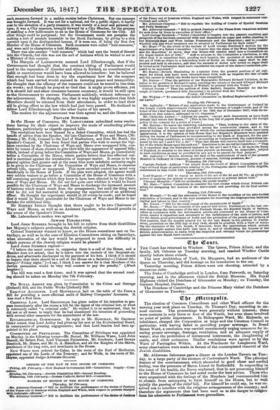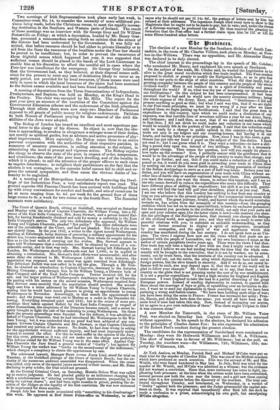'be Iflettopolis.
The election of Common Councilmen and other Ward officers for the ensuing year took place on Tuesday, St. Thomas's Day, according to an- nual custom. The proceedings were generally without interest; there were contests in only three or four of the Wards, but even these involved no point of public importance. In Bishopagate Ward, Mr. Richards, an inhabitant, charged the Corporation at large and the Common Council in particular, with having failed in providing proper sewerage. In Bread Street Ward, a resolution was carried unanimously urging measures for in- suring proper sewerage, drainage, ventilation, and an adequate supply of water; also the prohibition of intramural interments, the slaughtering of cattle, and other nuisances. Similar resolutions were agreed to by the Ward of Farringdon Within. At the Wardinote for Langbourn Ward, some observations were made in favour of the contemplated removal of the Jewish disabilities.
Mr. Alderman Salomana gave a dinner at the London Tavern on Tues- day, to a large party of the electors of Cordwainer's Ward. The principal feature of the entertainment, which abounded in good cheer and cordial feeling, was the presence of Baron Lionel de Rothschild. In responding to the toast of his health, the Baron explained, that in not presenting himself to the House of Commons he had acted under the best advice. Those who were acquainted with the feelings of the Members had recommended him to abstain from attempting to force himself on the House, but to wait quietly the passing of the relief bill. For himself he could say, he was re- solved not to interfere with the religious arrangements of the country ; and therefore the arguments that had been used as to the danger to religion from his admission to Parliament were groundless. Two meetings of Irish Representatives took place early last week, in Committee-room No 14, to consider the necessity of some additional pro- vision being made, before the Christmas recess, to meet the rapidly increas- ing destitution in the Southern and Western parts of Ireland. The result of these meetings was an interview with Sir George Grey and Sir William Somerville on Friday ; at which a deputation, headed by Mr. Henry Grat- tan, presented a memorandum setting forth an opinion that the extent of the distress had been underrated by the Government. It was fully ad- mitted, that before recourse should be had either to private liberality or to aid from the State the resources of the localities under the Poor-law should be proved to be insufficient; but, in order to prevent the recurrence of those frightful scenes which happened last year, it was suggested that sufficient means should be placed in the bands of the Lord-Lieutenant to enable him at his discretion to afford the needful aid in cases where the Poor-law was insufficient for the emergency. Sir George Grey intimated, that the Government bad, as they believed, at their disposal means suffi- cient for the present to meet any case of destitution likely to occur at an early period, not provided for by local resources, if those means were used only in cases in which the local resources of the union had been exercised to the fullest extent available and had been found insufficient.
A meeting of deputations from the Three Denominations of Independents, Presbyterians, and Baptista, was held on Monday, at the King's Head in the Poultry. The chair was occupied by Mr. Mills. The report for the past year gave an account of the exertions of the Committee against the Government Education scheme and the endowment of the Irish priesthood. Through their efforts there were now sixty-two Members of Parliament opposed to all grants of public money for religions endowments. Petitions to both Houses of Parliament praying for the removal of the civil dis- abilities of the Jews were adopted.
The Bishop of London has issued an excellent and most opportune pas- toral letter to the clergy of his diocese. Its object is, now that the cho- lera is approaching, to awaken in clergymen a stronger sense of their duties, not merely as spiritual guides, but as advisers and active promoters of phy- sical improvement. More especially, the Bishop urges them to an active personal cooperation with the authorities of their respective parishes, in measures of sanatory precaution, in calling attention to the subject, in stimulating the inert to prompt and vigorous action. The Bishop enjoins the clergy to observe the state of the poor, in respect of order, temperance, and cleanliness; the state of the poor man's dwelling, and of the locality in which it is placed; to call the attention of the proper officers to such cases as require interference; to enlighten their parishioners on the fact that the cholera is not contagious, as the opposite belief cannot fail to chill and re- press the natural sympathies, and thus cause the obvious duties of hu- manity to be neglected.
At a meeting of the Metropolitan Association for Improving the Dwel- lings of the Industrious Poor, a very satisfactory report was read. The ground opposite Old Pancras Church has been covered with buildings fitted up with every convenience for comfort and health, and sets of rooms can be let at rents ranging from 6s. 6d. per week for the ground floor of three large rooms to 3s. a week for two rooms on the fourth floor. The financial accounts were satisfactory.
The Court of Queen's Bench, sitting at Guildhall, was occupied on Saturday and Monday with the trial of Captain Charretie, Sir William Young, late a Di- rector of the East India Company, Mrs. Anna Stewart, and a person named Ral- lett, for having fraudulently obtained and sold for money a cadetship in the East India Company's service. The only two defendants who appeared, Sir William Young and Captain Charretie, pleaded "Not guilty." The other defendants were out of the jurisdiction of the Court, and had not pleaded. The facts of the case are shortly these. In the year 1842, a writer to the signet named Wotherspoon, residing at Edinburgh, being desirous of procuring a military appointment for his eldest son, became acquainted with Mrs. Stewart, from whom he sought informa- tion as to the best mode of carrying out his wishes. Mrs. Stewart appears to have told Wotherspoon that a commission could be obtained by means of a con- siderable outlay, and in that way only. Mrs. Stewart having left Edinburgh for London, Mr. Wotherspoon shortly afterwards sent her 1,1001., to be applied in obtaining a commission. Mrs. Stewart's first efforts were unsuccessful; and after some delay she returned to Mr. Wotherspoon 1,0801. In 1844, however, the negotiation was reopened, and the money was again remitted from Edinburgh. The defendant Rallett was now called in to aid the plan. Through a Mr. Trot- ter, he obtained an introduction to Captain Cbarretie, Secretary to the Asturias Mining Company; and through him to Sir William Young, a Director both of that Company and of the East India Company. Trotter received 501. for his aid; and the larger portion of Wotherspoon 's remittance was paid to Charretie. On parting with his money on the second occasion, Wotherspoon required from Mrs. Stewart some security that the negotiation should proceed. She accord- ingly sent him a letter addressed by Sir William Young to Captain Charretie, stating that he would have much pleasure in giving an appointment to young Wotherspoon in November. Accordingly, in that month the appointment was made; and the young man went out to Madras as a cadet in the December fol- lowing. Everything remained quiet until 1846; but in the course of some pro- ceedings then taken against Rallett by the East India Company in respect of other transactions, the suspicions of the Directors became roused, and a secret in- quiry brought to light the sale of the cadetship to young Wotherspoon. On these facts the present proceedings were founded. For the defence, it was admitted on behalf of Captain Charretie, that he had introduced Mr. Wotherspoon to Sir Wil- liam Young; but it was contended that no proof had been adduced of any con- nexion between Captain Charretie and Mrs. Stewart, or that Captain Charretie bad received any portion of the money. No doubt, he had done wrong in asking for the appointment without sufficient inquiry, and had most improperly endea- voured to conceal the affair. For this be must suffer in the opinion of the Jury; but this error, grievous as it was, did not make out the charge now preferred. The defence raised for Sir William Young was to the same effect. Against Cap- tain Charretie the Jury found ageneral verdict of " Guilty "; but against Sir William Young the verdict was " Guilty on the second count of the indictment," which charged a conspiracy to obtain the appointment by sale.
The celebrated lawsuit, Manager Bunn versus Jenny Liod, stood for trial on Tuesday, at the Guildhall sittings of the Court of Queen's Bench; but the cu- riosity of the numerous audience assembled was disappointed. When the cause was called, only seven of the special jurors answered to their names; and Mr. Bunn declining to pray a tales, the trial could not proceed.
At the Central Criminal Court, on Saturday, Horatio Nelson West was called up to receive judgment. He bad pleaded guilty to an indictment charging him with a misdemeanour in " uttering certain forged instruments, purporting to be scrip for railway shares"; and had been eight months in prison, pending the de- cision of the Judges on the legality of his first conviction. He was now sentenced to be imprisoned for three months.
Joseph Ady has been made acquainted with "something to his disadvantage" this week. He appeared at Bow Street Police-office on Wednesday, to show
cause why he should not pay U. 14s. 8d., the postage of letters sent by him but refused at their addresses. The ingenious Joseph tried every turn to show to the Magistrate that he ought not to be made to pay, but in vain; and, under the threat of a distress-warrant, he produced the cash. He then received the pleasing in- formation that the Poet-office had a further claim upon him for 121. or 13/. for some fifteen hundred other letters.
























 Previous page
Previous page